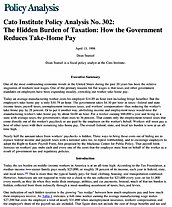One of the most confounding economic trends in the United States during the past 20 years has been the relative stagnation of workers’ real wages. One of the primary reasons for flat wages is that taxes and other government mandates on employers have been expanding steadily, crowding out worker take-home pay.
Today an average manufacturing worker costs his employer $14.89 an hour (not including fringe benefits). But the employee’s take-home pay is only $10.79 an hour. The government takes $4.10 per hour in taxes–federal and state income taxes, payroll taxes, unemployment insurance taxes, and workers’ compensation–thus reducing the worker’s take-home pay by 28 percent. Or to put it another way, abolishing income and employment taxes would raise the manufacturing worker’s take-home pay by about $4.00 an hour. For a worker earning $60,000 a year and living in a state with average taxes, the government’s share rises to 36 percent. That counts only the employment-related taxes that come directly out of the worker’s paycheck or are paid by the employer on the worker’s behalf. Workers still must pay a host of other taxes with their remaining take-home pay. The overall federal, state, and local tax burden is now at an all-time high.
Nearly half the amount taken from workers’ paychecks is hidden. Three ways to bring those costs out of hiding are to replace federal income and payroll taxes with a national sales tax, to repeal withholding, and to encourage employers to adopt the Right to Know Payroll Form, first proposed by the Mackinac Center for Public Policy. That payroll form itemizes on workers’ pay stubs each and every one of the costs that the employer must bear on behalf of the worker as a result of government tax and regulatory policies.
About the Author

This work is licensed under a Creative Commons Attribution-NonCommercial-ShareAlike 4.0 International License.
